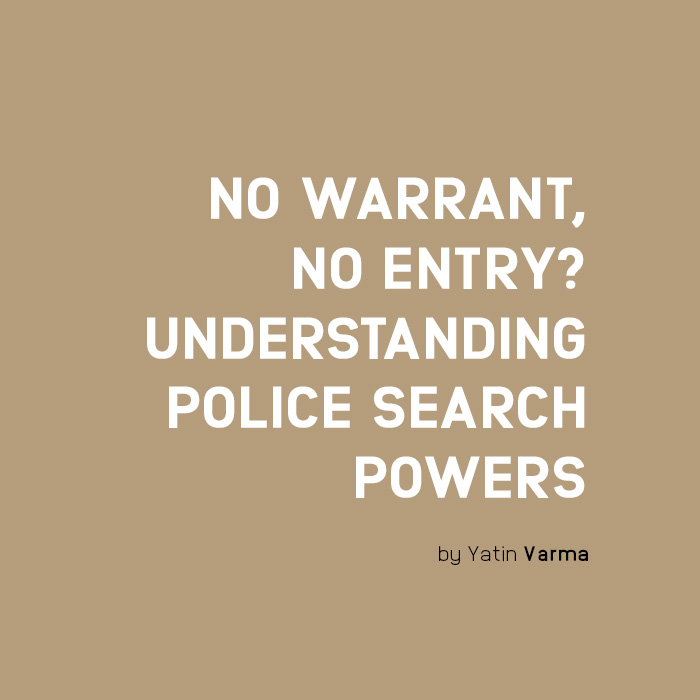Constitutional Protection:
Section 9(1) of the Constitution provides that except with his consent, no person shall be subjected to the search of his person or his property or the entry by others on his premises. However section9(1) is subject to the exceptions contained in section 9(2) like inter alia interests of defence, public safety, public order, public morality, public health. In RAMGOOLAM N V COMMISSIONER OF POLICE & ANOR [2015 SCJ 84], it was held that “The applicant is entitled to the protection of the law and the Constitution in so far as his privacy rights are concerned. The Constitutional protection afforded to him under sections 3, and 9 of the Constitution provides for permissible derogations by virtue of ‘law’ in the “public interest’ and in the interest of ‘public order’”. In VEERAPEN K.D. v THE STATE [2015 SCJ 439], it was stated “Now, section 9(1) of the Constitution provides that no person shall be subjected to a search of his person or property except with his own consent” and in MADHEWOO M. v THE STATE OF MAURITIUS AND ANOR (supra) it was further held: “However, the right which exists under section 9(1) of the Constitution for a person not to be subjected to bodily search except with his consent is not an absolute one. A limitation to that right is permissible under section 9(2)”. In Mauritius, police generally require a search warrant to lawfully search your home.
When Is A Search Warrant Required?
Under section 30 of the District and Intermediate Courts (Criminal Jurisdiction) Act 1852, a magistrate can issue a search warrant if there is reasonable cause to suspect that:
- Stolen goods or items obtained through a crime are concealed in a specific dwelling house or other premises
The warrant must specify the items sought and the exact location to be searched and should be conducted during daytime, unless there’s positive information- not a mere suspicion or a great emergency justifying action at any time.
Section 36 of the District and Intermediate Courts (Criminal Jurisdiction) Act 1852 provides for the situation where a credible witness proves, on oath before a Magistrate, reasonable cause to suspect that any person has in his possession any property which has been obtained by means of a crime or misdemeanour or any weapon or instrument used in the commission of a crime or misdemeanour. In such a situation, the Magistrate may grant a warrant to search for such property, weapon or instrument as in the case of stolen goods.
Can Police Issue A Search Warrant?
Pursuant to Section 14(1)(a) and (3) of the Police Act 1974, in urgent situations where obtaining a search warrant from a Magistrate would cause delays that could defeat the ends of justice, a police officer of at least the rank of Assistant Superintendent may issue a search warrant. This applies if there’s sworn information that a person unlawfully possesses:
- Dangerous drugs.
- Property obtained through an offence.
- Articles used or likely to be used in committing an offence.
The officer must report the circumstances and results of such a search to the Commissioner of Police and forward the endorsed warrant to the appropriate District Court promptly.
When Can A Search Warrant Be Issued?
In accordance with section 6 of the District and Intermediate Courts (Criminal Jurisdiction) Act 1852, a Magistrate may grant or issue any warrant or any search warrant on a holiday as well as on any other day.
Contents of the Search Warrant?
A search warrant must specify the goods which are the object of search, and the dwelling house or other premises where they are concealed or suspected to be concealed as provided for by section 33 of the District and Intermediate Courts (Criminal Jurisdiction) Act 1852.
Powers of Entry:
Under Section 34 of the District and Intermediate Courts (Criminal Jurisdiction) Act 1852, the officer charged with the execution of the warrant may lawfully enter any such dwelling house or premises with his assistants to execute the warrant, and they are justified in making search as directed by the warrant although the goods are not found and where the door is shut, the officer may proceed to break open the door, if after notification of his office and purpose and demand of admission duly made he is otherwise unable to obtain admittance.
Can The Occupier Be Arrested?
The warrant may also direct the arrest of the occupier of the dwelling house in which the goods are found, or of the person having the goods in his custody following section 32 of the District and Intermediate Courts (Criminal Jurisdiction) Act 1852.
Your Rights During A Search:
- Request to See the Warrant: You have the right to ask officers to present the search warrant before they enter your home.
- Consent: If officers do not have a warrant, they generally cannot enter your home without your consent, unless under the urgent circumstances.
- Digital Materials: Police can only access digital devices with your consent or with a Judge’s Order.
- Forced Entry: If entry is refused after officers present a valid warrant and state their purpose, they are legally permitted to use force to enter the premises.


Leave a Reply